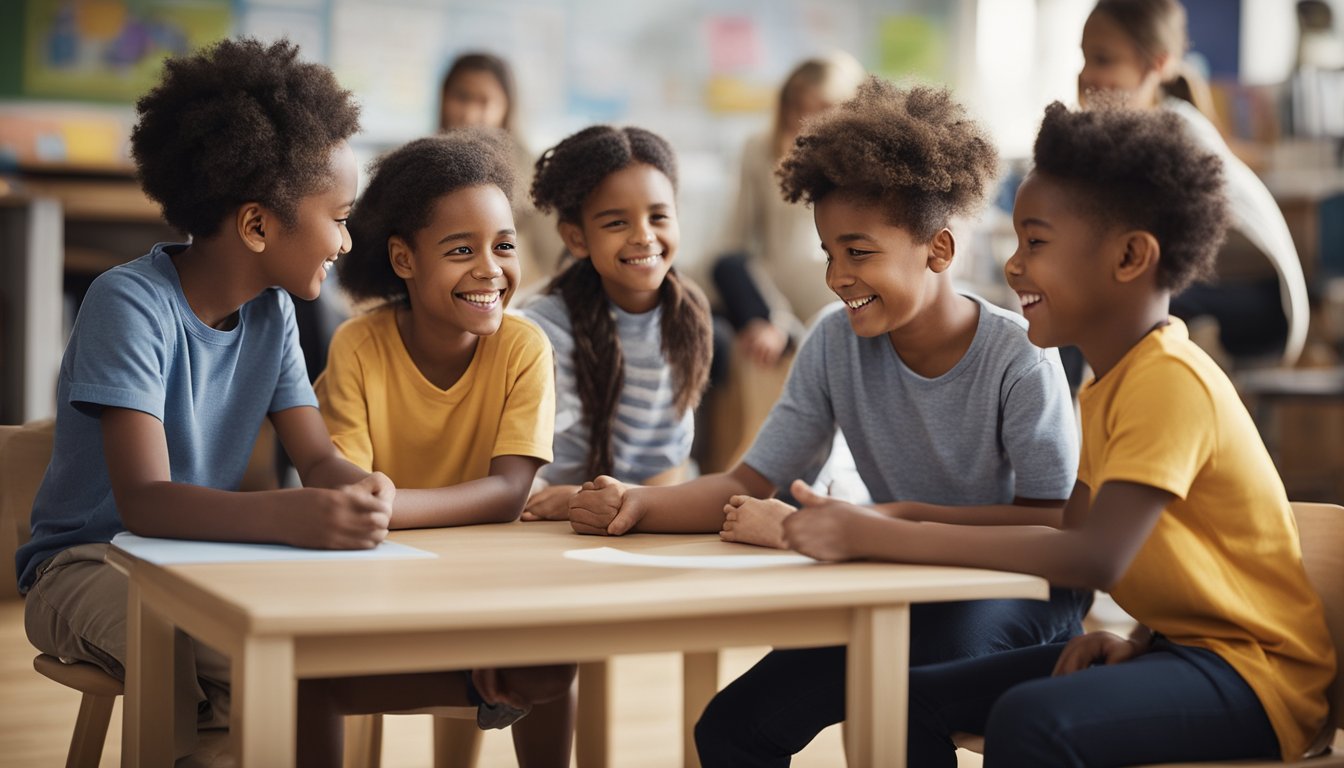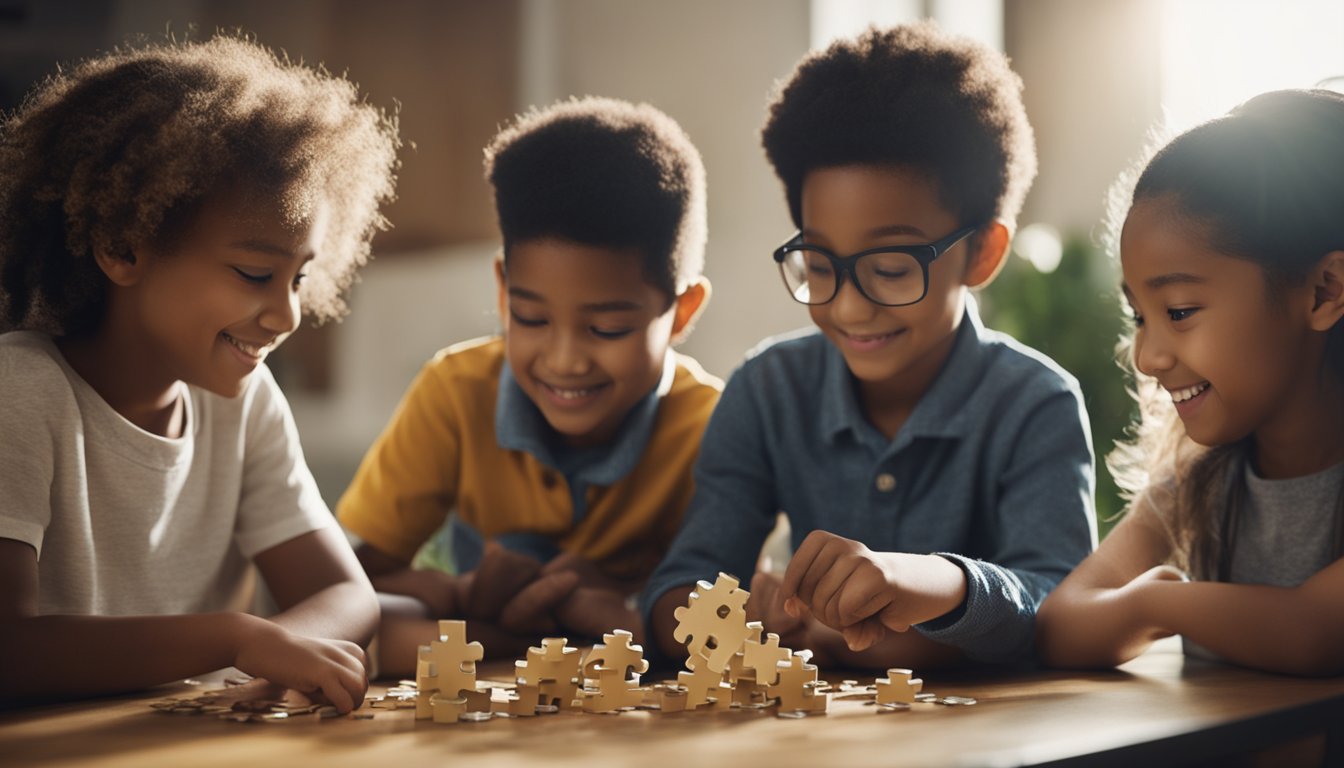Late updated: 08 Dec 2024 08:12
Written by:
Effective Ways To Foster A Growth Mindset In Children: Strategies for Success
Encouraging a growth mindset in children is a transformative step in their development, helping them view challenges as opportunities to learn rather than insurmountable obstacles. To truly foster this mindset, we should engage children in activities that promote perseverance and adaptability, whether in the classroom or at home. Such efforts can lay a strong foundation for a lifelong love of learning and personal growth.

We have found that nurturing curiosity and embracing mistakes as learning opportunities play a crucial role in developing a growth mindset. When children see parents and teachers model resilience and a positive attitude towards failure, they feel more comfortable taking risks and trying new things without fear of criticism. This approach not only benefits their educational journey but also enhances their social development and problem-solving skills.
An effective strategy involves creating a supportive community around the child, where feedback is constructive and encouragement is constant. This environment helps children feel valued and bolsters their confidence in their ability to grow and improve. By working together with families and educators, we can cultivate an atmosphere where growth is celebrated and every challenge is seen as a stepping stone toward greater achievements.
Key Takeaways
- Growth mindset transforms challenges into learning opportunities.
- Modelling resilience encourages risk-taking and adaptability.
- Supportive feedback enhances personal and educational development.
Cultivating a Growth Mindset in the Learning Environment
To effectively foster a growth mindset in children, it's essential to focus on creating an environment that encourages continuous learning and resilience. Key elements include prioritising the learning process over mere performance, promoting resilience, using mistakes as learning opportunities, and integrating specific activities to nurture a growth-oriented mindset.
Emphasising Learning Over Performance
In our learning environments, shifting the focus from performance to learning is crucial. We need to encourage children to value the process of acquiring knowledge rather than just the results. This involves recognising effort, curiosity, and perseverance as indicators of success. By doing so, we promote intrinsic motivation that inspires children to embrace challenges.
Teachers and parents can reinforce this by providing constructive criticism that highlights learning opportunities and supports mindset development. Celebrating small achievements as part of the broader learning journey fosters an appreciation for effort and growth.
Encouraging Persistence and Resilience
Persistence and resilience are key components of a growth mindset. We must teach children that intelligence and abilities can be developed through dedication. Activities like the "grit pie exercise" can be useful in building resilience by helping children identify controllable factors in challenging situations.
By normalising challenges and setbacks as essential parts of the learning process, we cultivate perseverance. Emphasising problem-solving skills and the value of continuous improvement further supports resilient attitudes. These efforts lay the foundation for children to adapt and thrive in varying circumstances.
Normalising and Learning from Mistakes
To foster a growth mindset, it's important to view mistakes as valuable learning opportunities. We need to create an atmosphere where making mistakes is seen as a step towards improvement rather than failure. This involves discussing the role of neuroplasticity—the brain's ability to adapt and learn from errors.
Encouraging children to reflect on their mistakes and identify lessons learned fosters a mindset geared towards ongoing growth. By keeping the focus on the potential for improvement, we help children build confidence in their problem-solving abilities and resilience in the face of setbacks.
Integrating Growth Mindset Activities
Implementing specific activities that reinforce a growth mindset can greatly enhance its development. Activities such as mindset journaling, goal setting, and team collaboration exercises can be integrated into the learning environment. These activities focus on developing the skills essential for a growth-oriented perspective.
Teachers can also incorporate storytelling and role-playing to illustrate the journey of overcoming obstacles. Interactive tasks that stimulate thinking and adaptability encourage children to see how perseverance leads to success. Regularly engaging in such activities builds a solid foundation for lifelong learning and personal growth.
Supporting Personal Development Through Community and Feedback

Our role in nurturing a growth mindset in children can be significantly enhanced through fostering supportive communities and using constructive feedback as tools for improvement. By combining communal support with effective feedback, we can encourage personal growth and emotional intelligence, laying a strong foundation for future success.
Fostering a Supportive Community
Creating a supportive community plays a pivotal role in personal development. When children are surrounded by peers and adults who prioritise growth, they benefit from mutual encouragement and learn to value diverse perspectives. Engaging in community activities fosters a sense of belonging and provides opportunities to overcome challenges collaboratively.
Positive relationships and a nurturing environment contribute to building confidence and motivation. These elements align with Carol Dweck's mindset theory, which emphasises the importance of collaboration and shared experiences in cultivating a positive attitude. Through a community-focused approach, children can develop essential critical thinking skills and creativity as they learn from others' strengths and challenges.
Role of Constructive Feedback in Growth
Constructive feedback is essential for fostering a growth mindset, helping children recognise areas for improvement and building resilience. Feedback should be specific and focused on effort, rather than innate ability, to reinforce the idea that intelligence and skills can be developed. Effective feedback increases self-worth and instils a love of learning by encouraging students to persist despite setbacks.
Utilising a growth mindset journal can help children reflect on the feedback they receive, enabling them to track their progress and set new goals. This practice enhances adaptability and optimism by reinforcing a positive outlook towards challenges. By focusing on constructive criticism, we guide children in overcoming obstacles with confidence.
Developing Self-awareness and Emotional Intelligence
Personal development heavily relies on fostering self-awareness and emotional intelligence. By assisting children in recognising their emotions and understanding how these influence their behaviour, we empower them to adapt and navigate social interactions successfully. This self-awareness enables children to identify their strengths and areas for growth, boosting their confidence and motivation.
Understanding emotions lays the groundwork for developing a positive attitude and persistence in learning. Emotional intelligence also involves empathy, allowing children to appreciate the perspectives of others, further strengthening community bonds. By integrating emotional intelligence into our support system, we enhance children's ability to form meaningful relationships and become more resilient in the face of challenges.
Frequently Asked Questions

Fostering a growth mindset in children involves using specific strategies that encourage continuous learning and reflection. In classrooms and at home, modelling these attitudes can significantly impact children’s development.
How can one encourage a growth mindset in children?
To encourage a growth mindset, we can ask open-ended questions that prompt children to think critically about their experiences and feelings. Encouraging perseverance and praising effort over innate ability helps children take on challenges positively.
What techniques are effective in cultivating a growth mindset within the classroom?
Implementing regular feedback, celebrating student achievements, and incorporating self-reflection activities are effective. These strategies emphasise that intelligence and abilities can be developed, helping students embrace mistakes as learning opportunities.
Can you suggest some activities that promote a growth mindset among children?
Activities such as setting achievable goals, journaling about personal improvements, and engaging in debates that focus on different perspectives can be beneficial. These activities teach children the value of persistence and the importance of learning from failures.
In what ways can educators model a growth mindset to their pupils?
Educators can model a growth mindset by displaying enthusiasm for learning and sharing their personal learning journeys, including failures. Demonstrating resilience and a willingness to adapt and change inspires students to adopt similar attitudes.
What are the core principles behind a growth mindset for children?
The core principles include an understanding that talents can be developed through dedication and hard work. Emphasising the value of effort, learning from criticism, and appreciating others' successes constitute the main elements that nurture a growth mindset.
How do various growth mindset interventions impact child development?
Interventions that focus on a growth mindset can lead to increased resilience, improved academic performance, and enhanced emotional well-being. By fostering an environment that supports growth and learning, children are more likely to develop confidence and adaptability.
